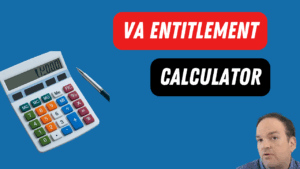
How To Use A VA Bonus Entitlement Calculator
How To Use A Va Bonus Entitlement Calculator How To Use A VA Bonus Entitlement Calculator Table of Contents Key Takeaways Why Bonus Entitlement Matters
Carlos Scarpero- Mortgage Broker
As a veteran, you’ve served our country with honor, and the VA home loan benefit is one way the nation shows its gratitude for your military service. If you’ve experienced financial difficulties resulting in bankruptcy, you may be concerned about your eligibility for a VA loan. However, I’m here to assure you that bankruptcy doesn’t automatically disqualify you from this valuable benefit. Let’s discuss the path to VA loan approval post-bankruptcy.
If you’ve undergone a Chapter 7 bankruptcy, the VA typically requires a two-year waiting period from the discharge date before you can be considered for a new VA loan. During this time, it’s crucial to:
Chapter 7 bankruptcy is addressed in Chapter 4 of the VA Handbook, and it says the following.
“The fact that a bankruptcy exists in an applicant’s (or spouse’s) credit history does not in itself
disqualify the loan. Develop complete information on the facts and circumstances of the bankruptcy.
Consider the reasons for the bankruptcy and the type of bankruptcy filing.
Bankruptcy Filed Under the Straight Liquidation and Discharge Provisions of the Bankruptcy Law
You may disregard a bankruptcy discharged more than 2 years ago.
If the bankruptcy was discharged within the last 1 to 2 years, it is probably not possible to
determine that the applicant or spouse is a satisfactory credit risk unless both of the following
requirements are met:
• the applicant or spouse has obtained consumer items on credit subsequent to the bankruptcy and
has satisfactorily made the payments over a continued period, and
• the bankruptcy was caused by circumstances beyond the control of the applicant or spouse such as
unemployment, prolonged strikes, medical bills not covered by insurance, and so on, and the
circumstances are verified. Divorce is not generally viewed as beyond the control of the borrower
and/or spouse.
If the bankruptcy was caused by failure of the business of a self-employed
applicant, it may be possible to determine that the applicant is a satisfactory credit risk if
– the applicant obtained a permanent position after the business failed,
– there is no derogatory credit information prior to self-employment,
– there is no derogatory credit information subsequent to the bankruptcy, and
– failure of the business was not due to the applicant’s misconduct.
If a borrower or spouse has been discharged in bankruptcy within the past 12 months, it will not
generally be possible to determine that the borrower or
spouse is a satisfactory credit risk.”
For those in a Chapter 13 bankruptcy, the waiting period is generally 12 months from the start of the repayment plan, provided all payments have been made on time. In some cases, lenders may consider your application while you’re still in the repayment plan, but this varies by lender and individual circumstances.
Chapter 13 bankruptcy is addressed in Chapter 4 of The VA Handbook and it says the following:
“This type of filing indicates an effort to pay creditors. Regular payments are made to a court-appointed trustee over a 2 to 3 year period or, in some cases, up to 5 years, to pay off scaled down or entire debts.
If the applicant has finished making all payments satisfactorily, the lender may conclude that the applicant has reestablished satisfactory credit.
If the applicant has satisfactorily made at least 12 months worth of the payments and the Trustee or the Bankruptcy Judge approves of the new credit, the lender may give favorable consideration.”
When applying for a VA loan after bankruptcy, be prepared to provide:
It’s advisable to work with a lender experienced in VA loans, particularly those familiar with post-bankruptcy applications. Transparency about your financial history is essential; a clear explanation of past difficulties and your subsequent financial recovery can positively influence your application.
The following chart shows how VA bankruptcy standard waiting periods (without extenuating circumstances) compare to other mortgage types.
| Chapter 7 Waiting Period | Chapter 13 Waiting Period | |
|---|---|---|
| VA Loans | 2 years | 1 year |
| Conventional Loans | 4 years | 2 – 4 years |
| FHA Loans | 2 years | 1 year |
| USDA Loans | 3 years | 1 year |
Navigating the path to homeownership can be challenging, especially if you’ve faced financial hurdles like bankruptcy. However, if you’re a veteran or active-duty service member, the VA home loan program offers a unique opportunity to achieve your dream of owning a home, even after bankruptcy. Here, we’ll address some frequently asked questions to help you understand the process and improve your chances of securing a VA loan.
A: The waiting period depends on the type of bankruptcy you’ve filed. For Chapter 7 bankruptcy, you typically need to wait 2 years from the discharge date. This waiting period may be reduced to one year with extenuating circumstances. For Chapter 13 bankruptcy, you may be eligible after 12 months of on-time payments in your repayment plan. This waiting period allows you to rebuild your credit and demonstrate financial stability.
A: Yes, it’s possible to qualify for a VA loan while still in Chapter 13 bankruptcy if you can show 12 months of on-time payments in the bankruptcy plan. However, you’ll need approval from the court or appointed trustee. This shows the lender that you are managing your repayment plan responsibly.
A: Generally, bankruptcy doesn’t affect your VA loan entitlement unless a previous VA loan was involved in the bankruptcy. Your entitlement is the amount the VA will guarantee on your loan, and it remains intact as long as you meet the other eligibility requirements.
A: Here are some steps to enhance your approval prospects:
A: Yes, you’ll need to provide a full explanation of why the bankruptcy occurred and show that you now have financial stability. Lenders will also look for improved credit history since the bankruptcy. Transparency about your financial history and demonstrating responsible financial behavior post-bankruptcy are key.
A: While still challenging, VA loans often have more favorable terms than conventional loans for those rebuilding credit after bankruptcy. Government backing can make lenders more willing to work with borrowers who have been bankrupt in the past. This includes benefits like no down payment and competitive interest rates.
A: VA home loan bankruptcy rules are found in Chapter 4 of the VA Handbook.
A: Many lenders have rules over and above what the VA requires. These rules are called lender overlays.
A: The best way to find a lender who can approve a VA home loan after bankruptcy is to apply through a mortgage broker.
A: The waiting period on a Chapter 7 bankruptcy begins on the discharge date.
A: The waiting period on a Chapter 13 bankruptcy begins on the bankruptcy filing date.
I can originate VA mortgage loans anywhere that I’m licensed.
I’m licensed in Alabama, Arkansas, Arizona, California, Colorado, Florida, Georgia, Illinois, Indiana, Iowa, Kansas, Kentucky, Louisiana, Maine, Maryland, Michigan, Minnesota, Mississippi, Missouri, New Mexico, North Carolina, Ohio, Oklahoma, Oregon, Pennsylvania, South Carolina, Tennessee, Texas, Utah, Virginia, Washington, and Wisconsin.
Additionally, our team can originate mortgages in several additional states through our corporate referral program.

How To Use A Va Bonus Entitlement Calculator How To Use A VA Bonus Entitlement Calculator Table of Contents Key Takeaways Why Bonus Entitlement Matters

Add Your Heading Text Here Can You Have Two VA Loans At The Same Time? Table of Contents Key Takeaways Introduction Can You Have Multiple

Credit Utilization: The #1 Mistake That Hurts Your Score Guest post by Sam Parker at MyCreditGuy Table of Contents Key Takeaways Understanding Credit Utilization: Why